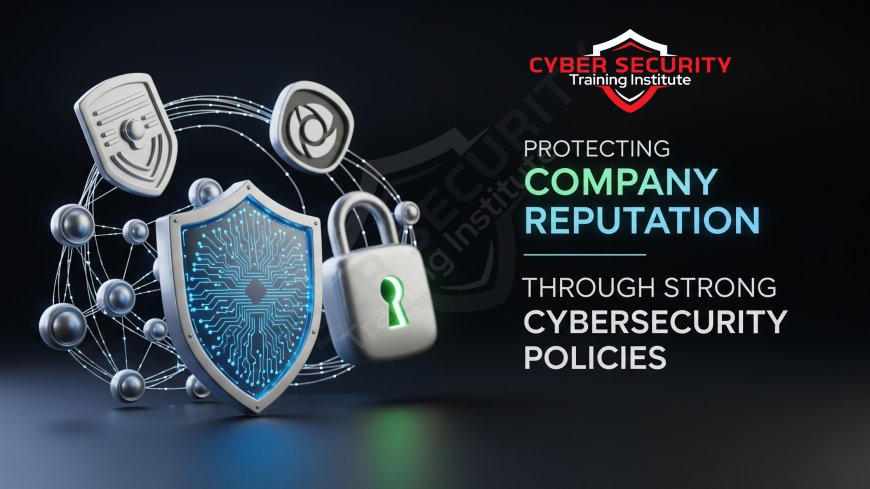Protecting Company Reputation Through Strong Cybersecurity Policies
In today’s digital age, a company’s reputation is one of its most valuable assets. A single cybersecurity breach can tarnish years of trust, erode customer confidence, and lead to significant financial losses. With cyber threats growing in sophistication, businesses must prioritize strong cybersecurity policies to safeguard their operations and maintain their good name. This blog explores how robust cybersecurity practices can protect your company’s reputation, offering practical insights for businesses of all sizes. From data breaches to ransomware attacks, the risks are real, and the consequences can be devastating. However, by implementing thoughtful cybersecurity measures, companies can not only protect sensitive information but also demonstrate their commitment to security, fostering trust with customers, partners, and stakeholders. Let’s dive into why cybersecurity is critical for reputation management and how you can build a secure foundation for your business.

Table of Contents
- Why Cybersecurity Matters for Reputation
- Key Elements of a Strong Cybersecurity Policy
- Real-World Consequences of Weak Cybersecurity
- Steps to Implement Effective Cybersecurity Policies
- Benefits of Strong Cybersecurity for Reputation
- Conclusion
- Frequently Asked Questions
Why Cybersecurity Matters for Reputation
A company’s reputation is built on trust. Customers, partners, and employees expect businesses to protect their data, whether it’s personal information, financial details, or proprietary business data. A cybersecurity breach can shatter this trust, leading to negative publicity, loss of customers, and even legal repercussions.
Cyberattacks are more common than many realize. According to recent studies, over 40% of businesses worldwide have experienced a cyberattack in the past year. When a breach occurs, the fallout often extends beyond financial losses. News of a data breach spreads quickly, amplified by social media and news outlets, causing long-lasting damage to a company’s image. Customers may feel betrayed, and partners may hesitate to continue doing business with a company perceived as insecure.
Strong cybersecurity policies act as a shield, protecting not just data but also the trust that stakeholders place in your business. By proactively addressing cyber risks, companies can demonstrate reliability and responsibility, reinforcing their reputation as trustworthy organizations.
Key Elements of a Strong Cybersecurity Policy
A cybersecurity policy is a set of guidelines and procedures designed to protect a company’s digital assets. It outlines how employees, systems, and data should be safeguarded against cyber threats. Below are the key elements every strong cybersecurity policy should include:
- Data Protection: Define how sensitive data, such as customer information or intellectual property, is stored, encrypted, and accessed.
- Employee Training: Educate staff on recognizing phishing emails, using strong passwords, and following security protocols.
- Access Control: Limit access to sensitive systems and data to only those who need it for their roles.
- Incident Response Plan: Create a clear plan for responding to breaches, including steps to contain, assess, and communicate the issue.
- Regular Updates: Ensure software, firewalls, and antivirus programs are kept up to date to protect against new threats.
- Third-Party Vendor Management: Vet and monitor vendors to ensure they meet your cybersecurity standards.
These elements work together to create a comprehensive defense against cyber threats, reducing the risk of a breach that could harm your reputation.
Real-World Consequences of Weak Cybersecurity
The impact of a cybersecurity breach can be catastrophic. To illustrate, let’s look at some real-world examples and their consequences:
| Company | Incident | Consequences |
|---|---|---|
| Equifax | 2017 Data Breach | Exposed personal data of 147 million people, leading to $425 million in settlements and a damaged reputation. |
| Target | 2013 Data Breach | Compromised 40 million credit card numbers, resulting in $200 million in costs and loss of customer trust. |
| Yahoo | 2013-2014 Breaches | Affected 3 billion accounts, leading to a $350 million reduction in its sale price to Verizon. |
These cases highlight how a single breach can lead to financial losses, legal battles, and a tarnished reputation. Customers often lose faith in companies that fail to protect their data, and rebuilding that trust can take years.
Steps to Implement Effective Cybersecurity Policies
Creating and maintaining a strong cybersecurity policy doesn’t have to be overwhelming. Here are practical steps to get started:
- Conduct a Risk Assessment: Identify your company’s most valuable digital assets and assess potential vulnerabilities.
- Develop Clear Policies: Write a cybersecurity policy that covers data protection, employee responsibilities, and incident response.
- Train Employees Regularly: Hold training sessions to teach employees about cyber threats and best practices.
- Use Strong Technology: Invest in firewalls, encryption, and multi-factor authentication to secure your systems.
- Monitor and Audit: Regularly review your systems for suspicious activity and audit your policies for effectiveness.
- Communicate Transparently: If a breach occurs, inform stakeholders promptly and outline the steps you’re taking to address it.
By following these steps, businesses can build a robust cybersecurity framework that protects both their data and their reputation.
Benefits of Strong Cybersecurity for Reputation
Investing in cybersecurity isn’t just about preventing attacks—it’s about building a stronger, more trustworthy brand. Here are some key benefits:
- Increased Customer Trust: Customers are more likely to do business with companies that prioritize their data security.
- Competitive Advantage: A strong cybersecurity record can set you apart from competitors with weaker practices.
- Regulatory Compliance: Adhering to data protection laws, like GDPR or CCPA, avoids fines and enhances your reputation.
- Employee Confidence: A secure work environment boosts employee morale and productivity.
- Long-Term Savings: Preventing breaches saves money compared to the costs of recovery and reputation repair.
By prioritizing cybersecurity, companies can turn a potential liability into a strength, showcasing their commitment to protecting stakeholders.
Conclusion
In an era where cyber threats are a constant concern, protecting your company’s reputation through strong cybersecurity policies is non-negotiable. A well-crafted cybersecurity strategy safeguards sensitive data, builds trust with customers and partners, and helps your business stand out as a reliable entity. By conducting risk assessments, training employees, and investing in robust technology, you can mitigate risks and demonstrate your commitment to security.
The consequences of neglecting cybersecurity are severe, as seen in high-profile breaches that cost companies millions and eroded public trust. However, with proactive measures, businesses can avoid these pitfalls and enjoy the benefits of a strong reputation. Start today by evaluating your current policies and taking steps to strengthen them—your company’s reputation depends on it.
Frequently Asked Questions
What is a cybersecurity policy?
A cybersecurity policy is a set of rules and procedures that guide how a company protects its digital assets, including data, systems, and networks.
Why is cybersecurity important for reputation?
Cybersecurity protects sensitive data, preventing breaches that can damage customer trust and lead to negative publicity.
How does a data breach affect a company’s reputation?
A data breach can lead to loss of customer trust, negative media coverage, and financial losses, all of which harm a company’s image.
What are common cyber threats businesses face?
Common threats include phishing, ransomware, malware, and insider threats, all of which can compromise data and systems.
How often should employees be trained on cybersecurity?
Employees should receive training at least annually, with refresher courses or updates when new threats emerge.
What is multi-factor authentication?
Multi-factor authentication requires users to provide two or more forms of identification, like a password and a code sent to their phone, to access systems.
Can small businesses afford cybersecurity?
Yes, small businesses can implement cost-effective measures like employee training, free software updates, and basic encryption tools.
What is an incident response plan?
An incident response plan outlines steps to take during a cyberattack, including containment, investigation, and communication with stakeholders.
How do I know if my company’s data is secure?
Conduct regular risk assessments and audits to identify vulnerabilities and ensure your security measures are effective.
Why is encryption important?
Encryption scrambles data to make it unreadable to unauthorized users, protecting it from theft or misuse.
Can cybersecurity policies help with legal compliance?
Yes, strong policies ensure compliance with data protection laws like GDPR, avoiding fines and legal issues.
What is phishing, and how can it be prevented?
Phishing is when attackers trick users into sharing sensitive information. Prevention includes employee training and email filtering tools.
How do I choose secure third-party vendors?
Vet vendors by reviewing their cybersecurity policies, certifications, and track record for handling data securely.
What is ransomware?
Ransomware is malicious software that locks a company’s data until a ransom is paid, often causing significant disruption.
How can I communicate a breach to customers?
Be transparent, inform customers promptly, and outline the steps you’re taking to address the breach and prevent future incidents.
Are free cybersecurity tools effective?
Some free tools, like antivirus software and firewalls, can be effective for basic protection but may need to be supplemented with paid solutions.
What is a firewall?
A firewall is a security system that monitors and controls incoming and outgoing network traffic to prevent unauthorized access.
How do I create a strong password policy?
Require passwords to be long, unique, and include a mix of letters, numbers, and symbols, and enforce regular updates.
Can cybersecurity improve customer loyalty?
Yes, demonstrating a commitment to data security builds trust, encouraging customers to remain loyal to your brand.
How long does it take to recover from a data breach?
Recovery can take months or even years, depending on the breach’s severity and the company’s response effectiveness.
What's Your Reaction?
 Like
0
Like
0
 Dislike
0
Dislike
0
 Love
0
Love
0
 Funny
0
Funny
0
 Angry
0
Angry
0
 Sad
0
Sad
0
 Wow
0
Wow
0









![How to Install RHEL 10 on VMware/VirtualBox [Tutorial]](https://www.cybersecurityinstitute.in/blog/uploads/images/202509/image_430x256_68b56dc967a4a.jpg)






